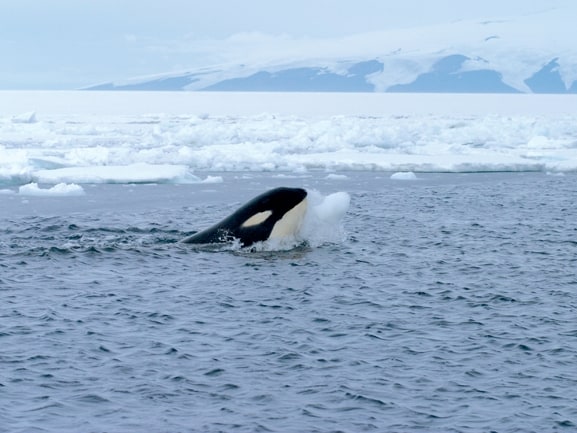
 A killer whale found this past March washed up in Esperanza Inlet in Nootka Sound, BC. The killer whale’s death was likely a result of an infection brought on by a satellite tag which was put in place by marine biologists only weeks beforehand.
A killer whale found this past March washed up in Esperanza Inlet in Nootka Sound, BC. The killer whale’s death was likely a result of an infection brought on by a satellite tag which was put in place by marine biologists only weeks beforehand.
A new report by the U.S. National Oceanic and Atmospheric Administration (NOAA) states most likely the “development of a fungal infection at the tag site contributed to the illness, stranding and death of this whale,” a result which adds to concern and criticism about the NOAA’s satellite tagging program. Currently suspended while staff review its effectiveness, the tagging program is part of the NOAA’s Recovery Plan for the Southern Resident killer whale, which aims at “identifying threats, data gaps and research priorities for the whale population.”
The satellite tagging practice uses a 15 centimetre titanium dart fired from an air-pressure device to implant the satellite tag in the whale. The dart is meant to fall off once the tag has been put in place, but biologists who examined L95, the 20-year-old male and member of the endangered Southern Resident population, found that fragments of the disposable dart were still in its fin.
The NOAA report states that a factor in the whale’s death could have been that the particular tag used on L95 had fallen in the water after an unsuccessful tagging attempt and had not been properly sterilized before re-deployment.
“The proper protocol would have been to clean it with alcohol and with bleach, and I believe the bleach step did not happen, and that was just human error,” said veterinary medical officer Deborah Fauquier with the NOAA.
But wildlife experts have earlier spoken out in criticism of the tagging method, urging that while the data received via satellite tagging is extremely helpful for tracking and conservation, the dart tagging procedure itself is both barbaric and invasive.
In a CBC report from April of this year, Kenneth Balcomb, senior scientist with the Center for Whale Research in Washington State, commented on the death of L95, noting that the tagging program had already been implicated in two other orcas going missing and possibly dying.
“Maybe these are also coincidental losses,” said Balcomb, “However, it is not coincidental that at least seven other satellite-tagged whales are still carrying hardware embedded in their tissues from the attachment fixtures, and some of the wounds have festered with restructuring tissue around the attached hardware”.
The NOAA panel behind the report stated that, “if the southern resident killer whale population is being impacted by environmental factors that are causing population-wide malnutrition and the overall population is in relatively poor general health, then the idea of implanting tags in these animals should be revisited, whether or not this tag caused the death of this particular individual.”
Currently listed as endangered by the U.S. Fish and Wildlife Service, the Southern Resident killer whale population which frequents the waters off the coast of Oregon, Washington and Vancouver Island was harmed in the 1960s and 70s by captures by marine parks, reaching a low of 71 individuals at one point. The community currently has about 80 members with only a few reproductive-age males, according to the NOAA.
Leave a Reply
You must be logged in to post a comment.




 Share
Share Tweet
Tweet Share
Share




Comment